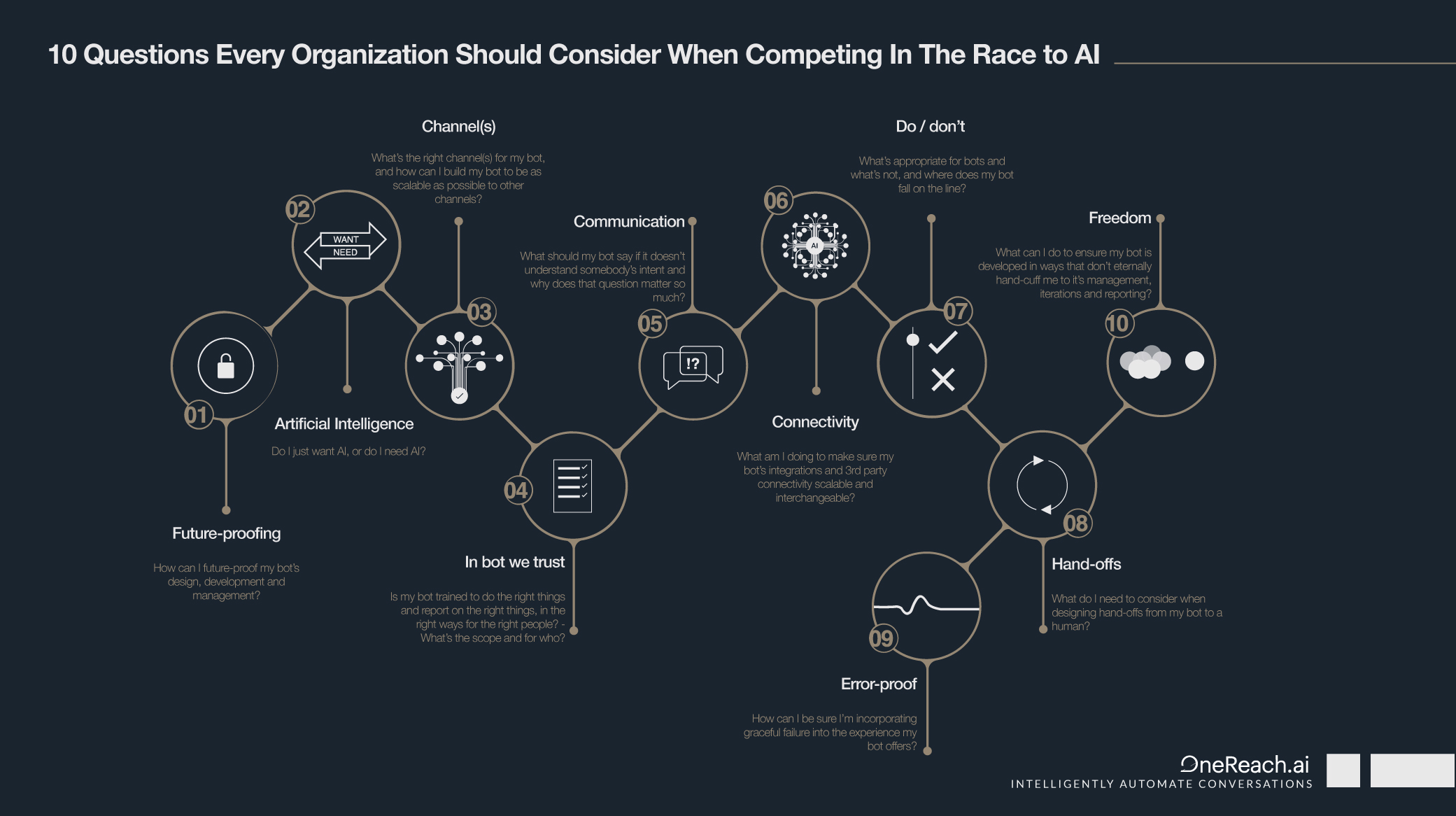
post
September 2, 2018
10 Questions Every Org. Must Consider If In The Race
In order to understand the importance of chatbots and voice bots in today’s business world, you first have to note the context [...]
In order to understand the importance of chatbots and voice bots in today’s business world, you first have to note the context in which they are being created. Despite the illusion of complexity, both types of bots are just software operating on an interface. And that interface also isn’t anything new; it’s actually the first interfaced used by humans: language. Built in to our cognitive development as humans, language is very much a part of who we are. Bots, then, aren’t creating something new. Instead, they’re simply finding a new way to do what we as humans have done for millenniums.
At the heart of the chatbot and voice bot revolution is the desire (and capacity) for using language to communicate with computers. The ability to do this means that we can actually train computers to not just understand, but also create, language, giving them the ability to tap into the interface we know so well.
In order for future bot experiences to be successful, they must be well-versed in the human language.
How do they acquire these skills?
Through the training we give to them.
While it would be plausible for the opposite to take place (us training ourselves to talk to computers, aka coding), it’s a much better user experience for computers to learn to speak to us via our language.
This, then, brings us to the 10 business, design and technology questions that everyone should explore before setting out to build bots or create other AI solutions.
You’re already past questions like “how do bots and AI work?”, “what can they do for my organization?” and “should my organization make a bot?”. You already know that stuff, and likely the last thing you need is more marketing and sales pitches peddling bots and AI as the magic answer.
Whether you’re looking to make your existing stuff more awesome or you’re just getting started on your first AI and bot-stuffs, we think that you’ll be glad for the questions and answers our customers came across through many years of bot-building and AI problem solving.
Here are 10 questions that everyone should explore before/during building bots and AI solutions.
- How can I future-proof my bot’s design, development and management? Now this may seem like an advanced question, and it is, but in order to save yourself and your organization lots of painful time and money, we’re going to get you thinking about it early. There’s no better way to get thinking about it than to get some important questions stuck in the back of your head – try your best to keep running through them as you’re working through building great bot experiences.
- How can I avoid betting early on AI platforms without missing early payouts or stifling progress? Wow – that’s a doozy. There’s a lot of action in the AI space right now and a lot of money getting poured into it by all sorts of companies that want you to bet on them. If you’re like us, you might feel a bit like it’s too early to bet on investing in one particular platform like a Watson, Google’s API.ai, Luis, etc, etc. Pick one? Seems like a tough bet. So we subscribe to not picking one – instead AB test them all and see which one is best for each pieces of the puzzle, knowing that they’ll all continue to change.
- What do I need to know in order to avoid super-gluing myself to platforms, providers and languages that might not be future-proof? We’ve learned how important this question becomes to all of our customers by seeing how painful it can be to change platforms, providers and languages mid-flight – maybe your SMS provider gets too expensive or your understandably weary of building a solution on a proprietary language that’s only usable on one platform – like Twilio or Nexmo, etc.
- How could reporting hold my bot back from it’s class, and how can I break the shackles early or avoid them altogether?
- Do I just want AI, or do I need AI?
- What’s the right channel(s) for my bot, and how can I build my bot to be as scalable as possible to other channels?
- Is my bot trained to do the right things and report on the right things, in the right ways for the right people? – What’s the scope and for who?
- What should my bot say if it doesn’t understand somebody’s intent and why does that question matter so much?
- What am I doing to make sure my bot’s integrations and 3rd party connectivity scalable and interchangeable?
- What’s appropriate for bots and what’s not, and where does my bot fall on the line?
- What do I need to consider when designing hand-offs from my bot to a human?
- How can I be sure I’m incorporating graceful failure into the experience my bot offers?
- What can I do to ensure my bot is developed in ways that don’t eternally hand-cuff me to it’s management, iterations and reporting?
Stay up to date
Latest Articles





